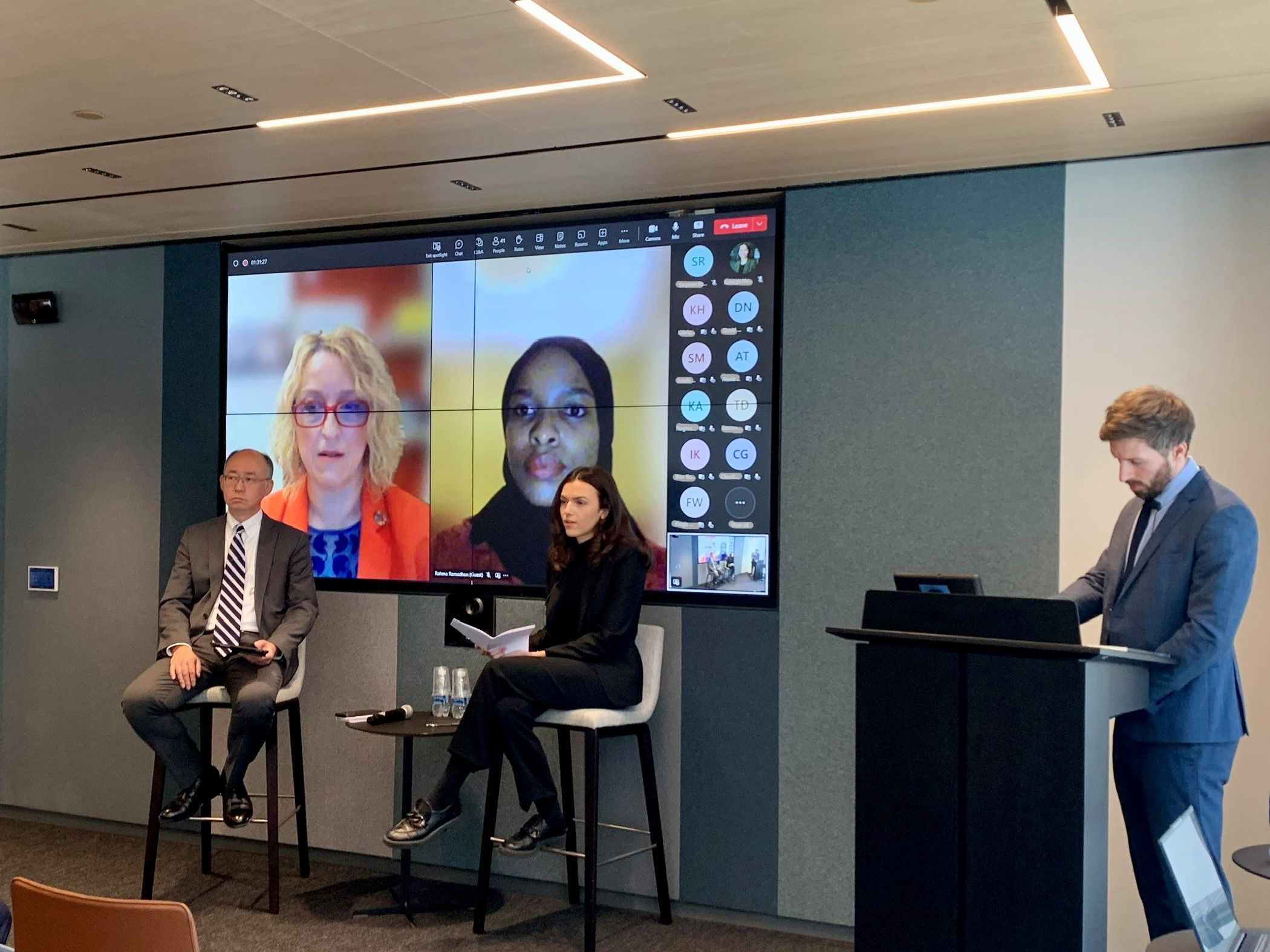

On 23 October 2023, the CSO Coalition on Human Rights and Counter-Terrorism, in partnership with the United Nations Special Rapporteur on the promotion and protection of human rights and fundamental freedoms while countering terrorism, the Permanent Mission of Canada to the UN, and the Permanent Mission of Switzerland to the UN, hosted the side event, “From Policy to Practice: Implementation of the Global Study on the Impact of Counter-Terrorism on Civil Society & Civic Space”.
Speakers included:
Prof. Fionnuala Ní Aoláin, UN Special Rapporteur on the promotion and protection of human rights and fundamental freedoms while countering terrorism
H.E. Mr. Robert Rae, Permanent Representative, Permanent Mission of Canada to the UN
Ms. Tanya Boulakovski, Legal Researcher, MENA Rights Group
Mr. Rio Hada, Chief, Equality, Development and Rule of Law Section, Office of the High Commissioner for Human Rights
Ms. Rahma Ramadhan, Research Fellow, Centre for Human Rights and Policy Studies
This side event brought together civil society, Member States, the United Nations and other stakeholders to discuss avenues to implement the recommendations presented in the Global Study on the Impact of Counter-Terrorism Measures on Civil Society and Civic Space, produced by the Special Rapporteur on the promotion and protection of human rights and fundamental freedoms while countering terrorism, Professor Fionnuala Ní Aoláin. The core analysis and findings of the Global Study on the Impact of Counter-Terrorism Measures on Civil Society and Civic Space were institutionalized in the Report of the Special Rapporteur on the promotion and protection of human rights and fundamental freedoms while countering terrorism transmitted to the General Assembly during the 78th session.
The event opened with remarks made by the Special Rapporteur and Ambassador Rae who both spoke on the wealth of data found within the Global Study. The Special Rapporteur highlighted the key findings from the Global Study, which was based on rigorous data-collection, including from civil society consultations in South Asia and Asia Pacific, Sub-Sharan Africa, Central and Eastern Europe, Latin America and Caribbean, Middle East & North Africa; and North America and over 100 written inputs. The findings show that the abuse of counter-terrorism is structural, and the scale at which the abuse occurs cannot be treated as a marginal issue or unintended consequence. The Study documented the pervasive discriminatory aspects of P/CVE and counter-terrorism efforts, in particular the use of these measures against religious and cultural minorities, women and girls, LGBT and gender diverse persons, indigenous communities, and other marginalized groups in society.
The Special Rapporteur called on Member States to call out misuse and abuse of counter-terrorism measures that targets civil society, the need for monitoring, oversight, and accountability of counterterrorism at the national, regional and global levels. The Special Rapporteur and Ambassador Rae encouraged Member States to engage and support civil society, who provide valuable advice on counter-terrorism policies, as evidenced during the UN Global Counter-Terrorism Strategy review led by Canada and Tunisia earlier this year.
The panel, comprised of Ms. Tanya Boulakovski, Mr. Rio Hada, and Ms. Rahma Ramadhan, highlighted key recommendations that resonated with their work and how to move forward with implementation of the Global Study. Ms. Tanya Boulakovski spoke on the need to bridge the gap between those working on human rights and those working on counter-terrorism policies to achieve a “fundamental transformation” as called for in the Global Study. Mr. Rio Hada addressed how the UN can further the recommendations in the Global Study, including by discussing ways to strengthen civil society engagement in the Global Compact’s Human Rights and Rule of Law Working Group, which OHCHR leads, and how to implement this across UN counter-terrorism entities.
Ms. Rahma Ramadhan spoke to a recommendation from the Global Study for Member States to create accountability mechanisms that build upon the data in the Global Study by establishing regional mechanisms to effectively address the impacts of counter-terrorism measures on organizations and human rights defenders.
Following the initial remarks by our speakers, the floor was opened for interventions from those joining us online and in-person, including representatives of civil society organizations as well as Permanent Missions. Interventions from the floor highlighted additional findings from the Global Study, including the use of counter-terrorism measures to curtail free speech and freedom of assembly, the deployment of new technologies for mass surveillance, measures taken by states to deliberately misuse CFT laws and administrative powers to suppress civil society, and the gendered impacts of counter-terrorism measures. Speakers highlighted the participatory and inclusive nature of the Global Study’s methodology, which was civil-society led. There was further discussion on ways to effectively bridge the gap between the human rights space in Geneva and the security space in New York, and the importance of including civil society in policy-making processes.
A recording of the event is available on YouTube and our events page.
The Global Study is available here.